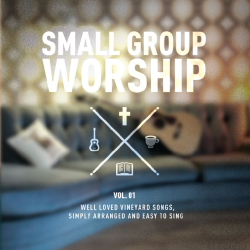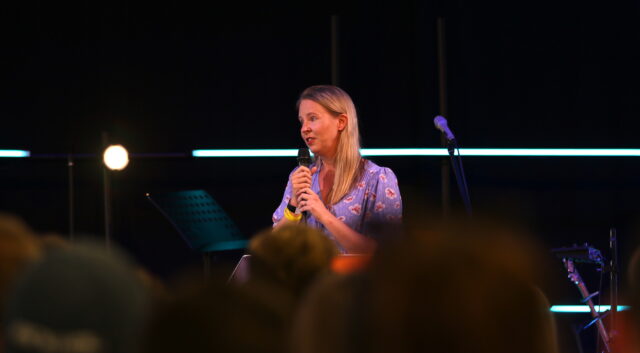As Vineyard Records UK release volume one of their ‘Small Group Worship’ albums, we take a look at how to lead worship in a Small Group setting and then what to do if you don’t have a worship leader in your Small Group.
Like many of you, I began my journey as a worship leader by leading a small group. I can still remember the terror of my first time. There were about twenty of us packed into a living room. I’m sure the air conditioner was on, but I was sweating profusely. Our home group pastor, Don, prayed an opening prayer and then gave me the go-ahead nod. More sweat poured down my face as I gripped my guitar so hard I thought it was going to break. Yet somehow I managed to strum the first chord, then the next. After awhile I dared to open my eyes. I couldn’t believe it; everybody was worshipping. It was the most amazing sight I’d ever seen.
Leading worship in a small group involves a lot more than strapping on a guitar.
Contrary to what some may think, leading worship in a small group involves a lot more than strapping on a guitar (or sitting down to a piano) and playing a few songs. Since that first night, I’ve learned quite a bit about preparing for and leading worship. My hope is that the following paragraphs will provide some necessary tools for helping you develop as a successful small group worship leader. I will begin by discussing several “big picture” issues and then move into focusing on the practical details.
FIRST THINGS FIRST: Understanding Dynamics
Leading worship in a small group means leading a small number of people, as opposed to an entire congregation. I realize that this is an incredibly obvious statement, but understanding the difference in dynamics between congregational worship and small group worship is essential.
An important dynamic to keep in mind is the level of participation. In a small group there will (probably) be less vocal participation. The reason for this is primarily a numbers issue. Let us compare a congregation of one hundred with a home group of ten. Each group has a certain amount (let’s say 15%) of people who can’t sing well, so they don’t. Along with these, are a handful of people (another 15%) who don’t understand what worship is all about, so they become spectators and may not sing out. Then there is a group (maybe 10%) who know what worship is all about, but are too introspective or self-conscious to sing out. Now that leaves us with approximately 60% who will worship and sing out.
Each group has a certain amount (let’s say 15%) of people who can’t sing well.
Applying this to our scenario of one hundred people in the congregation, this will leave us approximately sixty worshippers (not too bad). However, with a home group of ten, this only leaves six brave souls who are going to worship. Obviously, this scenario is not a hard and fast rule, but it does help to give a framework of how to gauge our expectation of our group’s participation.
Having a realistic expectation of your group’s level of participation in worship is important for several reasons. It will help you to:
1) Select an appropriate set list. If your group happens to have a low level of participation, then don’t choose songs that require the momentum of a larger group. Instead, use the songs that flow better in a more intimate setting.
2) Diffuse frustrations. Some worship leaders become frustrated by a lack of high participation. Stop and analyze what is really happening within your group. You may only have eleven people singing, but if your group’s size is twenty, then over half the group is joining in.
The Intimacy Factor
As I mentioned earlier, a small group by definition means that there are only a small number of people involved. Groups that I’ve been involved with have ranged from eight to thirty people. This dynamic automatically creates an intimate atmosphere that can be quite threatening for some people and hinder their ability to open up to God and/or each other. This intimate atmosphere will also make some people more reluctant to sing out for fear of sounding awful and being heard by others.
In reality, many people come into a small group with emotional, spiritual and physical wounds that desperately need the heavenly Father’s touch.
One way to overcome the “intimacy” factor is to give people time to feel secure within the group. Be patient since this may take several months. In reality, many people come into a small group with emotional, spiritual and physical wounds that desperately need the heavenly Father’s touch.
However, it will take some time for everyone to reach a level of security and trust where effective ministry can begin to happen. One of the things that will result from feeling secure and safe within the group is that people will begin to allow themselves to be more expressive in worship. Remember that worship is a very intimate and vulnerable experience. The level of freedom and enjoyment in worship will rise significantly when people feel that they can trust those around them.
HELPFUL HINTS & DETAILS: The Power of Prayer
The single most important tool that a worship leader can use in preparing to lead others in worship is prayer. There are three specific areas that I focus on when praying about worship. The first area of focus is asking God for sensitivity in choosing a set list. Prayer is one of the main avenues by which I determine what songs to sing. I will talk more about choosing a set list later.
Worship is one of the primary vehicles God chooses to minister to His bride.
Another key prayer focus as a worship leader should be asking God for specific revelation of the ministry needs of the group. Our churches, and consequently our small groups, are filled with people who are in need of the direct intervention of the Lord’s grace and mercy in their lives. Worship is one of the primary vehicles God chooses to minister to His bride. Therefore, the necessity of being in tune with God’s agenda for worship and not our own is absolutely vital.
A third focus for prayer is seeking a lifestyle of worship and humility. Worship is more than just singing great songs that make us think about God and our relationship with Him. Worship involves an ongoing lifestyle.
In the Hebraic culture, each human being (body, mind and spirit) was considered to be totally interconnected, united and indivisible. Therefore, the activity of worship was understood to be whole bodied (not passive), and encompassing every aspect of a per- son’s life. When I pray, I ask that God would help me to live a life of worship each and every day, not just when I have to lead worship, and also to help me to keep in mind the directive of Col. 3:15-17, “…what- ever you do, whether in word or deed, do it all in the name of the Lord Jesus…”
It’s Not About You
In I Peter 5:6 it says, “Humble yourself, therefore, under God’s mighty hand, that He may lift you up in due time.” Humility is an absolute must for anyone who desires to be effective in leading worship. Worship is all about Jesus our king. As a worship leader, it’s all about serving those we’re leading by turning their eyes upon the “author” and “perfector” of our faith. It’s not about what we as the worship leader desire!
I have been helped by the following suggestions in order to keep my focus on God’s heart for His people and to guard against operating out of my own agenda:
1) Don’t just pick favorite songs for the worship set. (Songwriters be careful not to only choose your own songs). Be sure to choose the songs that most appropriately communicate God’s heart, even if you don’t care for that particular song all that much.
it’s all about serving those we’re leading by turning their eyes upon the “author” and “perfector” of our faith.
Along the same line, be sure to play the songs in a key that is singable by the majority of the people. This will vary from group to group, but generally songs in the key of E and G are singable only by men with a high tenor range. I have found that songs in they key of C, D and F work nicely in small group settings where the strength of many voices or a full band is not present.
2) Check your plan of worship and ministry with the pastor or person in charge of the meeting. I’m not saying that you have to have every song approved before you play it. However, connecting with the person in charge (or the one who is speaking) before you begin will go a long way in ensuring that you have actually heard from God as to the meeting’s focus. It will act as a kind of check and balance system.
Using a Set List
One of the most common questions that I am asked in regard to leading worship is, “Should I use a set list when leading or should I just go with the flow?” My answer is, “Yes!”
I believe that it is important to take the time to think through the songs and actually plan a set list. My experience has been that if I’m diligent to seeking God’s heart, then the set list I come up with is usually right on target. And trust me, it is a more pleas- ant experience to follow a planned list of songs than to deal with the pressure and stress of picking out appropriate songs on the fly.
allowing the Holy Spirit to intervene and change the direction of the set is something that we must learn to do.
However, in reality, I have frequently found myself in the middle of a worship set and the next song that I’ve picked is either clearly inappropriate or just doesn’t feel right. That’s when it’s time to go with the flow.
If we truly desire to lead worship based on God’s agenda and not our own, then allowing the Holy Spirit to intervene and change the direction of the set is something that we must learn to do. After all, in this life, we will truly “…know in part…” the heart of God in any situation. Here are a handful of suggestions to help you “go with the flow”:
1) Don’t panic. It’s much easier to hear the voice of God when you’re not freaking out. Be encouraged and remember that God is for you. He wants you to be successful in leading worship and he’ll be faithful in giving you direction.
2) Have several alternative songs picked out and ready to go. My experience has been that the alternate songs that I’ve picked out just in case I needed them actually end up fitting the situation quite nicely.
It’s much easier to hear the voice of God when you’re not freaking out.
Another way that I select alternate songs is by having a current copy of my worship repertoire (about 100 song titles with they key signature) typed up in a small print and taped to the top of my guitar.
This little trick of the trade has been far and away one of the best tools in helping me lead effective worship. It’s also helped me to avoid those stressful and embarrassing times when I haven’t had a clue as to what song to do next.
The key is to not be afraid of silence or waiting on the Lord.
3) Don’t fall into the habit of launching into a time of “the Song of the Lord” or spontaneous singing whenever you aren’t sure what to do. The majority of the times when I have done this, I’ve ended up singing something “pathetic” instead of “prophetic.” The key is to not be afraid of silence or waiting on the Lord.
Small Doesn’t Mean Insignificant
I want to leave you with one final encouragement in your endeavor to lead worship in a small group: small doesn’t mean insignificant. Leading worship for a small group is not a step below leading worship for a congregation. It’s not less worthy or less honorable to be a home group worship leader rather than a main sanctuary platform worship leader.
In God’s eyes, the number of people in the group that you lead is irrelevant. What He’s interested in is our obedience in following Him and in serving His bride. Unfortunately, we sometimes give significance and worth to the things that garner more attention for ourselves or that seem more glamorous. Don’t fall into that trap.
Small Group Worship – Volume One
 For those who Small Group leaders who don’t have a worship leader in their group, you may find the following CD from Vineyard Records UK helpful.
For those who Small Group leaders who don’t have a worship leader in their group, you may find the following CD from Vineyard Records UK helpful.
Small Group Worship Vol.01 is the first in a new series of worship releases by Vineyard Records UK.
After talking with many local pastors it became clear that there was a need for a worship CD that would fill the role of a worship leader in a small group where one is not available.
Small Group Worship Vol.1 brings together 16 well-known songs that have been specially arranged in a fresh, simple and stripped down way. Featuring just vocals, acoustic guitar, piano and percussion these songs are especially intimate and have been deliberately keyed so that men and women can easily sing them together. Ideal for small worship gatherings or times of personal devotion, Small Group Worship Vol.1 is an accessible and inspirational tool for your worship times.
These songs were arranged and recorded at Hull Vineyard over 2 days by a small band of Vineyard worship leaders & musicians. Ronnie McDermid (vocals and guitar) is a worship leader at Trent Vineyard, Kate Cooke (vocals), is a worship leader from Hull Vineyard, George Quin (piano) is a member of the worship team at Trent Vineyard and Jesse Duley (acoustic guitar) is worship coordinator at Kingdom Vineyard, St Andrews.
Tracklisting
1.Holy
2.Jesus’ Name
3.More Than A Friend
4.Arms Of Love
5.I Lift My Eyes Up
6.Hungry
7.Refiner’s Fire
8.Surrender
9.One Thing Remains
10.Sweetly Broken
11.Adore Him
12.I Love Your Presence
13.Unfailing Love
14.All Who Are Thirsty
15.Be The Centre
16.Amazing Grace
Listen to and buy this album from the Vineyard Worship shop.









